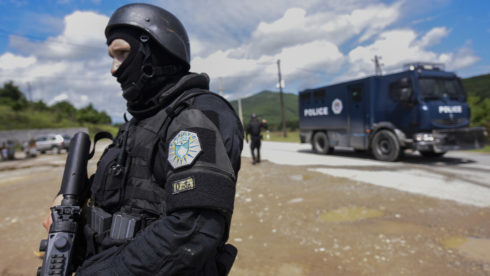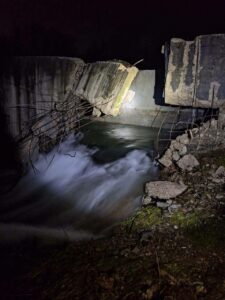On the evening of November 29th, a major emergency took place in Kosovo. An explosion damaged the canal that supplies water to the two main power plants that provide electricity to almost the entire Republic.
According to the head of the Kosovo water company an explosive device was thrown into the canal, which damaged the wall of the bridge. He said that the water supply, including supplies of drinking water to the capital Pristina, should be stopped in order to eliminate the problem as soon as possible, since this is the main supply channel for the Kosovo Energy Corporation, the main electricity supplier in the country.
Kosovo Albanian Prime Minister Albin Kurti called the incident a terrorist attack “aimed at destroying critical infrastructure” but the local authorities have not yet provided any data on the causes and consequences of the explosion and victims.
Kosovo Interior Minister claimed that eight suspects in the explosion were arrested tonight in the north of the country (of course) near the border with Serbia. As part of the investigation, a “huge arsenal of weapons” was reportedly confiscated. Under the pretext of the incident, the Kosovo security forces staged raids in Zubin Potok, Zvecan, Leposavich and Kosovska Mitrovica. Searches are ongoing in Kosovo and Metohija, and the forces of the KFOR NATO contingent have been deployed to the north of the region.

Illustrative Image: A member of the Kosovo Police Special Unit near the village of Cabra during the May 28, 2019 raids in the predominantly Serb north of Kosovo. IMAGE: AFP / Armend Nimani
As expected, Serbia was blamed for allegedly being behind the attack. The Kosovo Interior Ministry claims that the explosives came “from Serbian warehouses.” However, no evidence of Belgrade’s involvement in the incident has been provided. Kurti is expected to demand the West to punish Belgrade. The EU Ambassador to Kosovo has already condemned the sabotage at the water utility, which “deprived a significant part of Kosovo of water supply.”
Local sources suppose that the explosion was an false flag operation aimed to blame Belgrade and soften up the ground for further escalation. The details of the incident are yet to be revealed bu the local media rushed to point the suspect accusing Serbia without any evidence and fueled hysteria claiming heavy damage to critical infrastructure. Despite the claims by the head of the local Interior Ministry that the explosive were allegedly taken from Serbian warehouses, in fact, they could be easily taken in the black market or be simple IEDs.
Earlier on Friday, the Kosovo police announced increased security measures following two recent attacks in which hand grenades were thrown at a police station and a municipality building in northern Kosovo, where ethnic Serbs live.
Another wave of escalation is expected in Kosovo. The provocation is particularly timely now when all the battlefields are ‘surprisingly’ set in a blaze, including in Ukraine, Georgia, Syria.
The culprits are yet to be revealed. Meanwhile, the local reporters recalled that Britain has recently completed the training of Kosovo security forces in “intelligence and sabotage activities” and their advanced course in military engineering.
MORE ON THE TOPIC:
- Ukrainian Rear Infrastructure Came Under Combined Attack Of Russian Drones And Missiles
- Syrian Rebels Secure Idlib, Capture Two Airports In Aleppo & Enter Hama (Videos)
- Military Situation In Kosovo On September 25, 2023 (Map Update)
- Immediately After Conflict In Nagorno-Karabakh Subsided, West Escalated Situation In Kosovo. First Casualties Reported







everyone in the world is fighting his neighbor. sure is a messy situation..!
no they aren’t its strategic and its history repeating .
yes. they should concentrate on the source to it all, and to nazi germany; “us”.
blow up the atlantic cables. force them back to the island of death and destruction.
erase it from the surface. ethnic cleansing in its finest. well, its not ethnic, its de-satanification.
if you don’t like trick movies which blame other people, and mass murder in the hospitals.
kosove will return home
stupid little nato thinks it can create problems in syria for russia and its allies without any repercussions…well, there are plenty of groups in the balkans waiting to give uncle shlomo a very hard wake up!!!
rroka mandoljinë belgredë can’t doo a thinga.
oreshnik can do a thing, 6 things every milli second for 6 milli seconds and even your diaper is vaporized… talk big, perform like small dicked south korean kpop star… wonder why their birth rate collapsed…small dicks like you in occupation force.
i’m afraid so!
serbian army bombed kosova electricity and water system . kosova is serbian nato can not change it.
patriotism is the last refuge of the scoundrel .ben franklin the globalist .imo .
patriotism, the last line of defense against communist shlomo homopushing genocidal cuck suckers…
1.ma rk zuc kerberg (face book) 400 000 usd and (goog le ceo) su nd p, 400000 usd they both paid to kim be rly che atle (ex secre t servi ce administ ator) money and orde red her (not to prot ect do nald tru mp)
2.these le ft ist mi lli oners said to kim berl y ch ea tle (we will send our gu ys to k ill don al d tru m p)
3.some of the fem ale sec ret ser vice mem bers are corr upt, these fema les giv es the all info to trum p ki ll e rs
1.mark zuckerberg (face book) 400 000 usd and (goog le ceo) sund p, 400000 usd they both paid to kim berly cheatle (ex secre t service administator) money and ordered her (not to protect do nald trump)
2.these left ist milli oners said to kim berly chea tle (we will send our guys to kill don al d trump)
3.some of the female secret service members are corrupt, these females gives the all info to trump killers
message to president trump,
its time to get serious actions :
1. life time jail to leftist facebook mark zuckerberg
who banned you from fb in 2018 and paid 400 million usd dollars to shooter for killing you like kennedy at rally
2.life time jail to google ceo, sund p
who paid 400 million usd dollars to shooter for killing you at golf .
eleminate these guys they are financing your killing or they will eleminate you at 3rd attemp.
be careful
congratulations
isoli
🇺🇸
it’s a good thing you’re not in power .
kosova will back to home serbia again.
whoever it is stop it this wont end well for anyone. keep the balcans calm for gods sake.
they hate slavs dont you remember? the romans named them slavics as they believed they were so stupid they were fit only to be enslaved.
stupid ass angoloid!!! slave in latin is “servus” so where the f*ck do you get “slav” from that??? stop thinking from your little angoloid mind!!
this guy talks so mush shit he could repave the transiberian highway in his bullshit and not miss a spot of tarmac.
rroka mandoljin̈ë rtokam saksophonë shljak betonë.
the anglo scum ia totally desperated, activating all their pawns
england was rome’s colony .is really again .imo .by law because the coronation crown is the catholic crown of edward the confessor. the western romans went to venice when rome collapsed ,then from there to the city .
exactly that… these psychopaths are starting all the little fires they can start…
you know who the culprits are unless you’re stupid.
who said in effect that , we are going to make certain trump cant stop what we started .?
smells like another false flag attack to unleash more chaos before trump sits down to take another dump on the american christian world….
kosovo i metohija is not a republic.
leftist usa demokrats are totally desperated, trying to start ww3 to deny trumps administration. left put explosives i kosovo and kosova is not republic its serbian ex land
1.turkish military educated these rebels.
2.turkey paid salaries to these rebels.
3.russia’s and iranian backed esad loosed aleppo city.
4. winners (turkey,usa,israel,pakistan, ukraina) 1
– looser (russia and iran backed esad 0)
5.putin fires general after major losses
syrian 2nd biggest city aleppo,
entered under turkish control before trump with ukranian help..